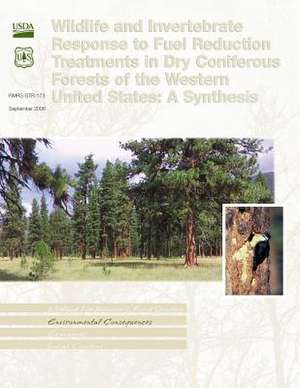Wildlife and Invertebrate Response to Fuel Reduction Treatments in Dry Coniferous Forests of the Western United States
Autor United States Department of Agricultureen Limba Engleză Paperback
Preț: 106.28 lei
Nou
Puncte Express: 159
Preț estimativ în valută:
20.34€ • 21.75$ • 16.96£
20.34€ • 21.75$ • 16.96£
Carte disponibilă
Livrare economică 27 martie-10 aprilie
Preluare comenzi: 021 569.72.76
Specificații
ISBN-13: 9781511608510
ISBN-10: 151160851X
Pagini: 42
Dimensiuni: 216 x 279 x 2 mm
Greutate: 0.12 kg
Editura: CREATESPACE
ISBN-10: 151160851X
Pagini: 42
Dimensiuni: 216 x 279 x 2 mm
Greutate: 0.12 kg
Editura: CREATESPACE
